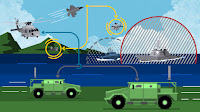During an airborne test series, Defense Advanced Research Projects Agency (DARPA) and Lockheed Martin [NYSE: LMT] Advanced Technology Laboratories (ATL) demonstrated the capability of a cognitive electronic warfare (CogEW) system that learns to dynamically counter adaptive communications threats. DARPA’s Behavioral Learning for Adaptive Electronic Warfare (BLADE) program acted as a pathfinder program in DoD CogEW, detecting, characterizing, and countering advanced wireless communication threats in minutes, not months.
“Our team is proud to be a BLADE performer with DARPA,” said Dr. J. Scott Rodgers, Spectrum Systems Lab Director, Lockheed Martin ATL. “This effort allows us to prove the viability of applying machine learning techniques to spectrum challenges, providing smarter spectrum operation capabilities.”
The BLADE program successfully demonstrated its communications jamming technology at a government test site. Lockheed Martin engineers, joined by representatives from their subcontractor, Raytheon, flew in a modified Piper Navajo aircraft for several hours, collecting over-the-air RF energy from instrumented wireless communications test signals that included military radios, cell phones and specialized datalinks. Raytheon provided their next generation Electronic Warfare System, Silencer, to host the BLADE machine-learning software for the flight test series. More than 25 people representing multiple government organizations watched as the airborne BLADE system dynamically sensed, characterized and jammed adaptive wireless communication threats across various tactical scenarios.
BLADE is enabling a shift from today's manual-intensive, lab-based countermeasure development approach to an adaptive, in-the-field systems approach.
More importantly, the technology provides the warfighter with increased capability to counter new or advanced threats which can quickly adapt or change its electronic profile. Lockheed Martin engineers and scientists developed novel machine-learning algorithms and techniques that rapidly detect and characterize new radio threats, dynamically synthesize new countermeasures, and provide accurate electronic battle damage assessment based on over-the-air observable changes in the threat.
Source : Lockheed Martin Corporation (NYSE: LMT)
The growing number of wars and transnational disputes, emergence of cognitive electronic warfare technology, increased system reliability and efficiency due to the introduction of TWT (travelling-wave tube)-based systems, and advancements due to integrated electronic warfare systems are the factors driving the market.
According the the firm, the electronic support is the largest share-contributing segment in the electronic warfare market. This segment plays a significant role in recognizing the threats in tactical environment.
In 2016, the North America region dominates the electronic warfare market, whereas, the Asia-Pacific region is projected to grow at the highest CAGR during the forecast period. This is mainly attributed to huge population base, booming economy, increasing funding/investments towards the development of EW products, growing focus of both, international and domestic players on the APAC EW market, and a large number of R&D activities.
Source: EE Times Europe
In February 2015, Exelis announced that plans had been approved for the sale of the company through a cash/stock purchase to competitor Harris Corporation. The purchase price of 4.75 billion dollars was reported as being one of the highest such defense company purchases, since the Lockheed/Martin merger. When finalized in June 2015, the purchase was expected to make Harris/Exelis one of the top 10 defense contractors in the United States. [6][7]
Article
Feb. 6, 2015 | http://aviationweek.com/awin-only/harris-corp-buy-exelis-deal-valued-475-billion







No comments:
Post a Comment